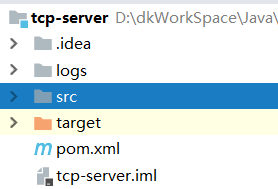震惊!这可能是我与底层最接近的一次编程体验
1.netty能做什么
首先netty是一款高性能、封装性良好且灵活、基于NIO(真·非阻塞IO)的开源框架。可以用来手写web服务器、TCP服务器等,支持的协议丰富,如:常用的HTTP/HTTPS/WEBSOCKET,并且提供的大量的方法,十分灵活,可以根据自己的需求量身DIV一款服务器。
用netty编写TCP的服务器/客户端
1.可以自己设计数据传输协议如下面这样:

2.可以自定义编码规则和解码规则
3.可以自定义客户端与服务端的数据交互细节,处理socket流攻击、TCP的粘包和拆包问题
2.Quick Start
-
创建一个普通的maven项目,不依赖任何的三方web服务器,用main方法执行即可。

-
加入POM依赖
<!--netty的依赖集合,都整合在一个依赖里面了-->
<dependency>
<groupId>io.netty</groupId>
<artifactId>netty-all</artifactId>
<version>4.1.6.Final</version>
</dependency>
<!--这里使用jackson反序列字节码-->
<dependency>
<groupId>com.fasterxml.jackson.core</groupId>
<artifactId>jackson-databind</artifactId>
<version>2.9.7</version>
</dependency>
<!--加入log4j 便于深入学习整合运行过程的一些细节-->
<dependency>
<groupId>log4j</groupId>
<artifactId>log4j</artifactId>
<version>1.2.17</version>
</dependency>
- 设计一套基于TCP的数据传输协议
public class TcpProtocol {
private byte header=0x58;
private int len;
private byte [] data;
private byte tail=0x63;
public byte getTail() {
return tail;
}
public void setTail(byte tail) {
this.tail = tail;
}
public TcpProtocol(int len, byte[] data) {
this.len = len;
this.data = data;
}
public TcpProtocol() {
}
public byte getHeader() {
return header;
}
public void setHeader(byte header) {
this.header = header;
}
public int getLen() {
return len;
}
public void setLen(int len) {
this.len = len;
}
public byte[] getData() {
return data;
}
public void setData(byte[] data) {
this.data = data;
}
}
这里使用16进制表示协议的开始位和结束位,其中0x58代表开始,0x63代表结束,均用一个字节来进行表示。
- TCP服务器的启动类
public class TcpServer {
private int port;
private Logger logger = Logger.getLogger(this.getClass());
public void init(){
logger.info("正在启动tcp服务器……");
NioEventLoopGroup boss = new NioEventLoopGroup();//主线程组
NioEventLoopGroup work = new NioEventLoopGroup();//工作线程组
try {
ServerBootstrap bootstrap = new ServerBootstrap();//引导对象
bootstrap.group(boss,work);//配置工作线程组
bootstrap.channel(NioServerSocketChannel.class);//配置为NIO的socket通道
bootstrap.childHandler(new ChannelInitializer<SocketChannel>() {
protected void initChannel(SocketChannel ch) throws Exception {
//绑定通道参数
ch.pipeline().addLast("logging",new LoggingHandler("DEBUG"));//设置log监听器,并且日志级别为debug,方便观察运行流程
ch.pipeline().addLast("encode",new EncoderHandler());//编码器。发送消息时候用过
ch.pipeline().addLast("decode",new DecoderHandler());//解码器,接收消息时候用
ch.pipeline().addLast("handler",new BusinessHandler());//业务处理类,最终的消息会在这个handler中进行业务处理
}
});
bootstrap.option(ChannelOption.SO_BACKLOG,1024);//缓冲区
bootstrap.childOption(ChannelOption.SO_KEEPALIVE,true);//ChannelOption对象设置TCP套接字的参数,非必须步骤
ChannelFuture future = bootstrap.bind(port).sync();//使用了Future来启动线程,并绑定了端口
logger.info("启动tcp服务器启动成功,正在监听端口:"+port);
future.channel().closeFuture().sync();//以异步的方式关闭端口
}catch (InterruptedException e) {
logger.info("启动出现异常:"+e);
}finally {
work.shutdownGracefully();
boss.shutdownGracefully();//出现异常后,关闭线程组
logger.info("tcp服务器已经关闭");
}
}
public static void main(String[] args) {
new TcpServer(8777).init();
}
public TcpServer(int port) {
this.port = port;
}
}
只要是基于netty的服务器,都会用到bootstrap 并用这个对象绑定工作线程组,channel的Class,以及用户DIV的各种pipeline的handler类,注意在添加自定义handler的时候,数据的流动顺序和pipeline中添加hanlder的顺序是一致的。也就是说,从上往下应该为:底层字节流的解码/编码handler、业务处理handler。
- 编码器
编码器是服务器按照协议格式返回数据给客户端时候调用的,继承MessageToByteEncoder代码:
public class EncoderHandler extends MessageToByteEncoder {
private Logger logger = Logger.getLogger(this.getClass());
protected void encode(ChannelHandlerContext ctx, Object msg, ByteBuf out) throws Exception {
if (msg instanceof TcpProtocol){
TcpProtocol protocol = (TcpProtocol) msg;
out.writeByte(protocol.getHeader());
out.writeInt(protocol.getLen());
out.writeBytes(protocol.getData()







 最低0.47元/天 解锁文章
最低0.47元/天 解锁文章
















 1208
1208

 被折叠的 条评论
为什么被折叠?
被折叠的 条评论
为什么被折叠?








